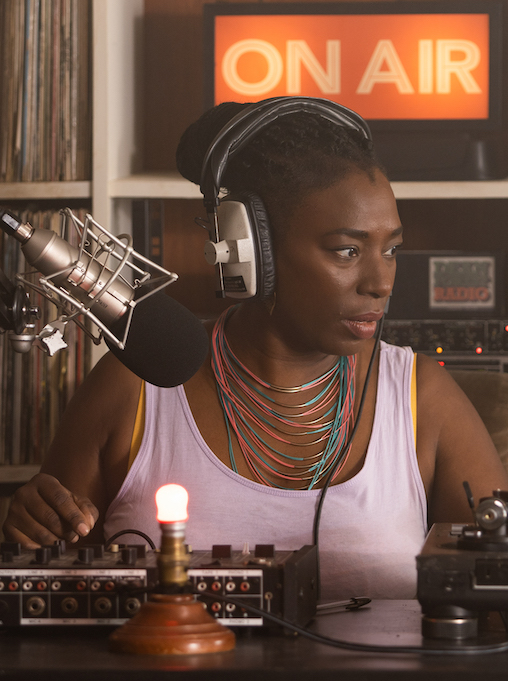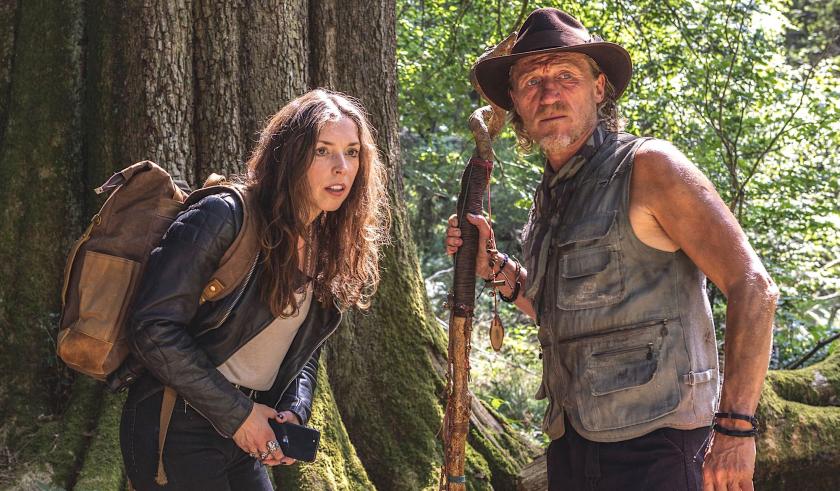Young women who were riveted by Helen Fielding’s Bridget Jones columns in the 1990s are now probably of the age where the menopause is, or has recently been, a bigger concern than landing your own Mr Darcy. Which is why Bridget Christie’s The Change (Channel 4) has arrived with ideal timing.
I don’t mean Christie’s series is “the new Bridget Jones”. About the only significant crossover between the two – a prickly stance towards misogyny and lesser male infringements aside – is their obsession with keeping tabs on their daily round. Fielding sent up her own love of logging calorie counts and glasses of wine consumed. Bridget Christie’s Ledgers, though, are accounts of the length of time the character she plays, Linda, has spent doing tasks for other people, typically her family. Each chore is timed and logged. When her husband Steve (Omid Djalili, pictured below) finds the ledgers, they make unhappy reading for him: an entry for “Sex with Steve”, for example, takes up less than two minutes of Linda’s time that day.
She is tired of cleaning up after two teenage children and a man whose special skill is catching hot dogs in his mouth. Worse, nobody acknowledges she is doing it. She feels invisible. Now she thinks she has early onset dementia as she’s irritable, words fail her. A doctor who has himself forgotten to take off his bike helmet is sure it’s actually the menopause.
So she resurrects her miraculously full-working-order old motorbike for a trip to the Forest of Dean, the locus of her childhood happiness. When her mother died, 10-year-old Linda had stowed a tin full of her treasures in an oak tree there, her “time capsule”; now she is going back to find it, to reclaim her lost minutes and hours for herself and, she hopes, her sense of who she is.
 This journey of self-discovery might sound a tad Californian, or Midsommar with touches of Schitt’s Creek, a townie’s tussle with eccentric locals and their arcane rituals. But it’s 100% Bridget Christie, whose stage act has always delivered its pointed feminism with great wit and a warm, generous sense of the absurd, all with a Gloucestershire lilt. The dialogue here sparkles, and the setups last only as long as they need to, so it whizzes past.
This journey of self-discovery might sound a tad Californian, or Midsommar with touches of Schitt’s Creek, a townie’s tussle with eccentric locals and their arcane rituals. But it’s 100% Bridget Christie, whose stage act has always delivered its pointed feminism with great wit and a warm, generous sense of the absurd, all with a Gloucestershire lilt. The dialogue here sparkles, and the setups last only as long as they need to, so it whizzes past.
In the forest, Linda rents a dilapidated caravan from two eerie army-capped sisters, Carm and Ag (Monica Dolan and Susan Lynch), who run a pie and mash stand there. It’s hard to say which of them is deadpan funnier, possibly Dolan. Linda settles into a new existence, portraying herself as childless and sitting at the local caff reading De Beauvoir’s The Second Sex, with songs from the English folk tradition commenting on the action.
The motley crew Linda meets there are a stellar bunch: Trousers Tony (Paul Whitehouse), a pub regular whose mystery choice of legwear is the subject of an annual sweepstake; non-binary Ryan (Sonny Charlton), a Legolas lookalike who runs cat speed-dating sessions; Pig Man (Jerome Flynn), who tends the wild pigs in the forest; “the Verderer” (Jim Howick from Ghosts), whose call-in show on the town’s radio station brings out his vilest opinions.
Key to the town’s good humour is the aptly named Joy (Tanya Moodie, pictured below), who shares DJ duties with the Verderer and whose sultry voice is the honey to his vinegar. Joy oils the wheels of the locals’ dealings with each other, notably their preparations for the annual Eel Festival, run by the father (pronounced “fayther”) of Carm and Ag, to celebrate the eel’s bisexuality. Eels replace hot dogs as the phallic symbol in Linda’s life.
Christie’s edgier feminist material slightly dips in the middle section as the plot takes over: a new road is being built through the forest, despite irate opposition, and Linda’s beloved oak is in its path. How to save it? This strand elbows aside her family as a narrative interest – she and her children stay in touch by texting each other shots of the moon – and makes the grotesqueries of the supporting characters less pronounced, sometimes implausibly. Rank racists become tree-huggers? In TV-comedy-land, yes. But overall this is a thoughtful piece about the larger meanings of “change”: the transitions characters undergo moving between genders, between white and Black communities, between ancient and modern, grief and joy.
 Christie is a very likeable and able performer whose face delicately registers all the emotions Linda experiences. She and Moodie also have some choice wordless encounters, whose meaning is conveyed by emphatic moves of the eyes. More verbal in her dealings is Liza Tarbuck, in a hilarious turn as Big Sis, Linda’s older sister Siobhan, who’s as loud and heavy-handed as any of the men. If she can’t yell at Linda she sends her texts in capital letters.
Christie is a very likeable and able performer whose face delicately registers all the emotions Linda experiences. She and Moodie also have some choice wordless encounters, whose meaning is conveyed by emphatic moves of the eyes. More verbal in her dealings is Liza Tarbuck, in a hilarious turn as Big Sis, Linda’s older sister Siobhan, who’s as loud and heavy-handed as any of the men. If she can’t yell at Linda she sends her texts in capital letters.
Things go quite Jez Butterworth’s Jerusalem as the six episodes proceed, an unashamed thumbs up for the folk traditions of Albion (one of the tracks Joy plays is “Adieu to Old England”). Linda is no saint, and old England is no picnic, but the sense of a community coming together with Linda’s assistance is touching.
It’s Christie's wit, though, and her barbed, often mad dialogue, cleverly structured with running jokes and brilliantly edited, that make this an exceptional comedy. Scenes where her menopausal amnesia leads Linda down conversational rabbit holes – which go something like, “You know, it’s the film with that man with the quiff in it who was in that film with the Australian woman”… “Mark Kermode,” suggests Carm. “Fayther had a commode,” adds Ag – will be whooped at by the menopausal. And there are strident declarations about the injustices of women’s lot, from Carm and Ag as well as Linda, that women of all ages will cheer at. A second series hasn’t been commissioned yet, but this indelible character should get a second outing.















Add comment